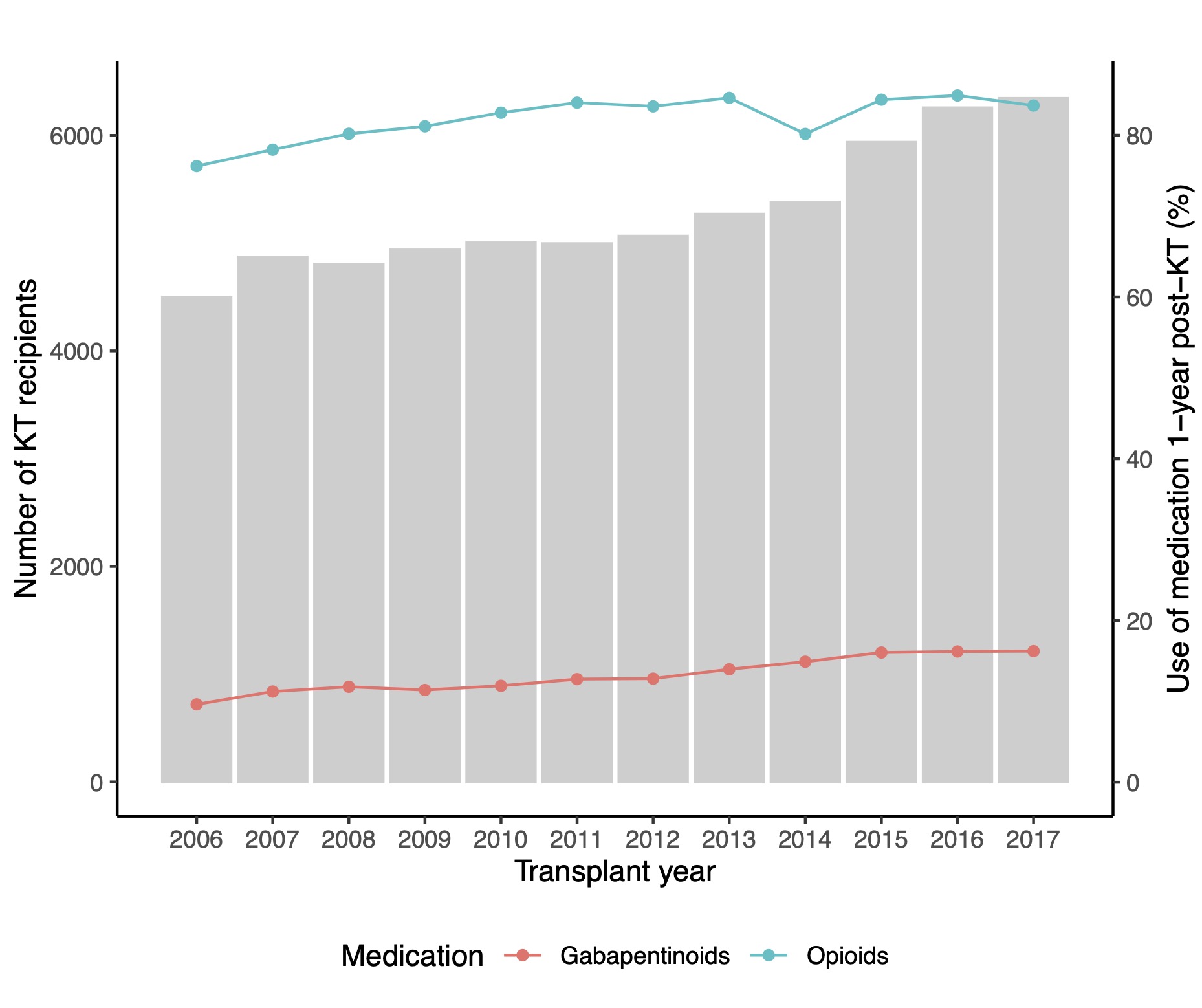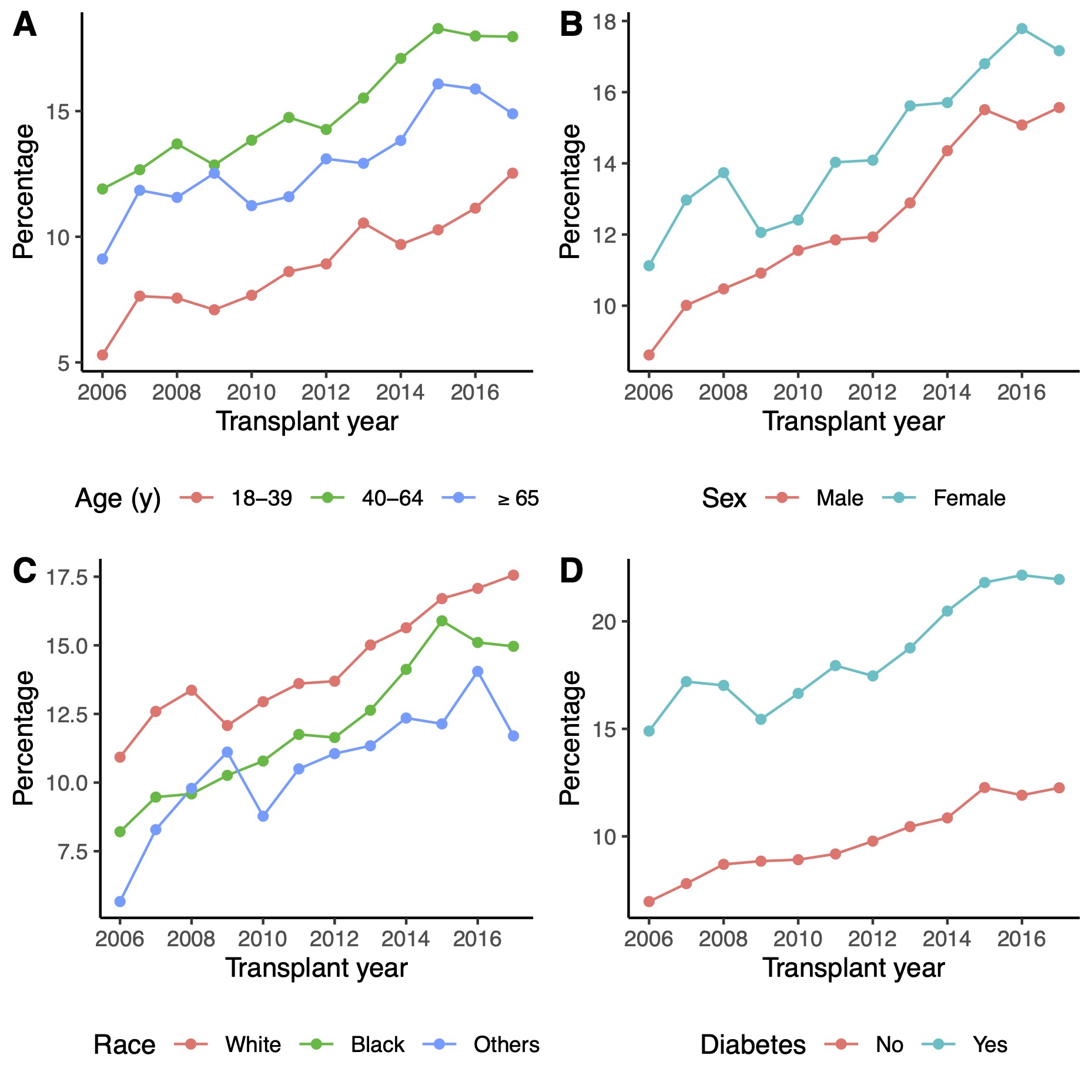Trends in Prescribing Gabapentinoids, Co-Prescribed with Opioids or Benzodiazepines Among Kidney Transplant Recipients
1Johns Hopkins University, Baltimore, MD, 2Saint Louis University, St. Louis, MO, 3Drexel University, Philadelphia, PA
Meeting: 2022 American Transplant Congress
Abstract number: 156
Keywords: Kidney transplantation, Mortality, Pain
Topic: Clinical Science » Pharmacy » 30 - Non-Organ Specific: Clinical Pharmacy/Transplant Pharmacotherapy
Session Information
Session Name: Non-Organ Specific: Clinical Pharmacy/Transplant Pharmacotherapy
Session Type: Rapid Fire Oral Abstract
Date: Sunday, June 5, 2022
Session Time: 5:30pm-7:00pm
 Presentation Time: 6:40pm-6:50pm
Presentation Time: 6:40pm-6:50pm
Location: Hynes Room 312
*Purpose: Gabapentinoid are commonly used to manage neuropathic pain in recipients with kidney transplantation (KT), with increasing concerns of co-prescribing with opioids and benzodiazepines leading to higher mortality risk. We aimed to examine secular trends in prescribing gabapentinoids and co-prescribing opioids or benzodiazepines with gabapentinoids among KT recipients.
*Methods: Using USRDS and Medicare claims, we studied adults (aged≥18) who received KT between 2006-2017 with Medicare Part D at the time of KT. Co-prescription of opioids or benzodiazepines with gabapentinoids was defined as having filled opioids or benzodiazepines prescriptions within 7 days of the date of dispensing gabapentinoids. We calculated the percentage of patients with the prescription during 1 year post-KT, stratified by year at KT and demographic factors (age, sex, race, and diabetes). Then, we used Cox regression to quantify the risk of mortality by gabapentinoids prescription.
*Results: Of 63,359 KT recipients, 13.4% filled at least one gabapentinoids prescription within 1 year post-KT. The percentage of KT recipients with gabapentinoids prescription during the first year of KT increased over time (9.6% in 2006 vs. 16.2% in 2017). Recipients with age 40 to 64, female, White, and those with diabetes were likely to be prescribed with gabapentinoids. Of the 8,509 recipients with gabapentinoids prescription, 45.3% was co-prescribed with opioids, 7.4% was co-prescribed with benzodiazepines, and 3.3% was co-prescribed with both opioids and benzodiazepines. Recipients with no gabapentinoids prescription had lower mortality risk (adjusted hazard ratio [aHR]=0.790.840.90) and those co-prescribed gabapentinoids with either opioids or benzodiazepines had higher mortality risk (aHR=1.201.311.43) compared with recipients with gabapentinoids prescription.
*Conclusions: Among KT recipients, gabapentinoids prescription has increased over time with higher co-prescription with opioids or benzodiazepines, which were associated with increased mortality.
To cite this abstract in AMA style:
Ahn J, Bae S, Kim J, Schnitzler M, Hess G, Lentine K, Segev D, McAdams-DeMarco M. Trends in Prescribing Gabapentinoids, Co-Prescribed with Opioids or Benzodiazepines Among Kidney Transplant Recipients [abstract]. Am J Transplant. 2022; 22 (suppl 3). https://atcmeetingabstracts.com/abstract/trends-in-prescribing-gabapentinoids-co-prescribed-with-opioids-or-benzodiazepines-among-kidney-transplant-recipients/. Accessed February 16, 2026.« Back to 2022 American Transplant Congress


